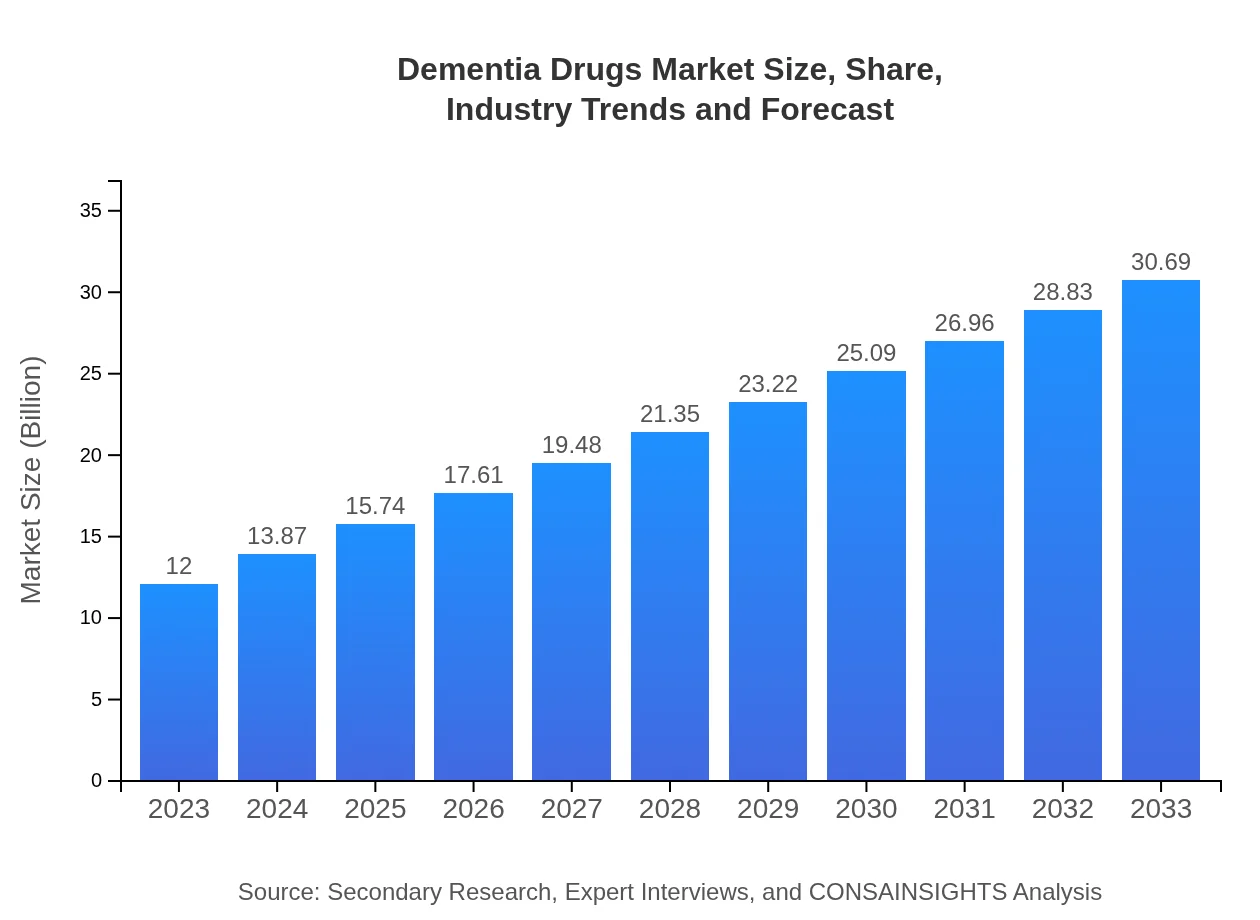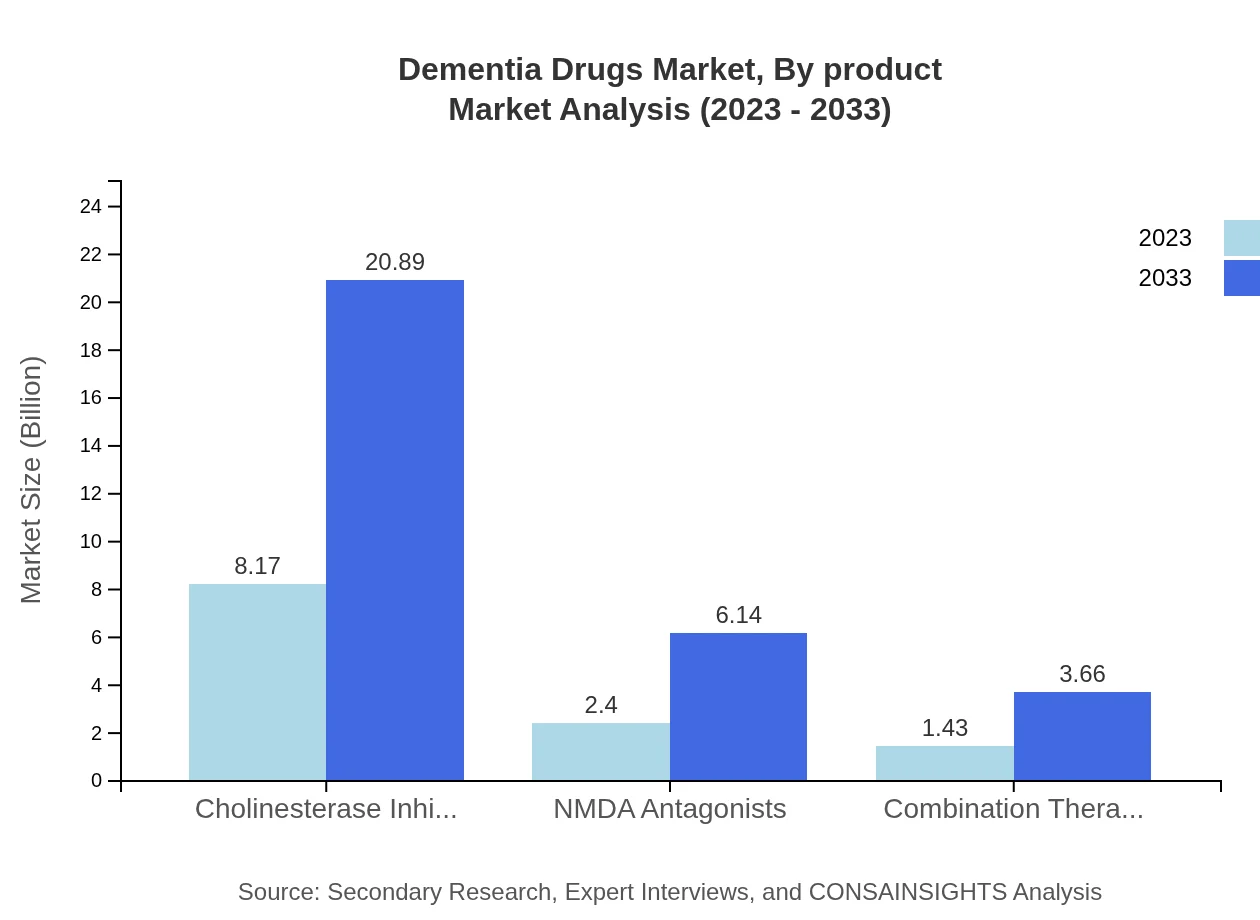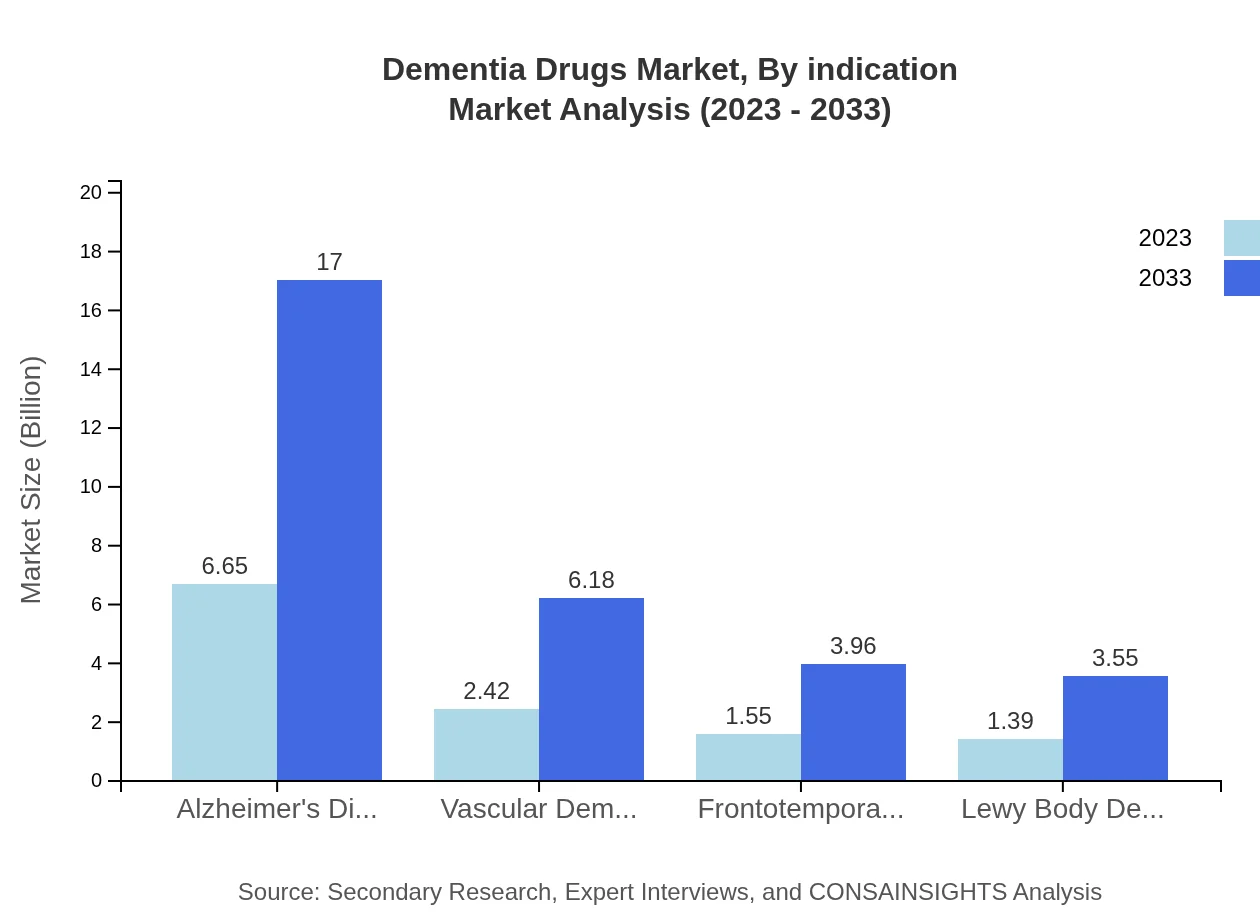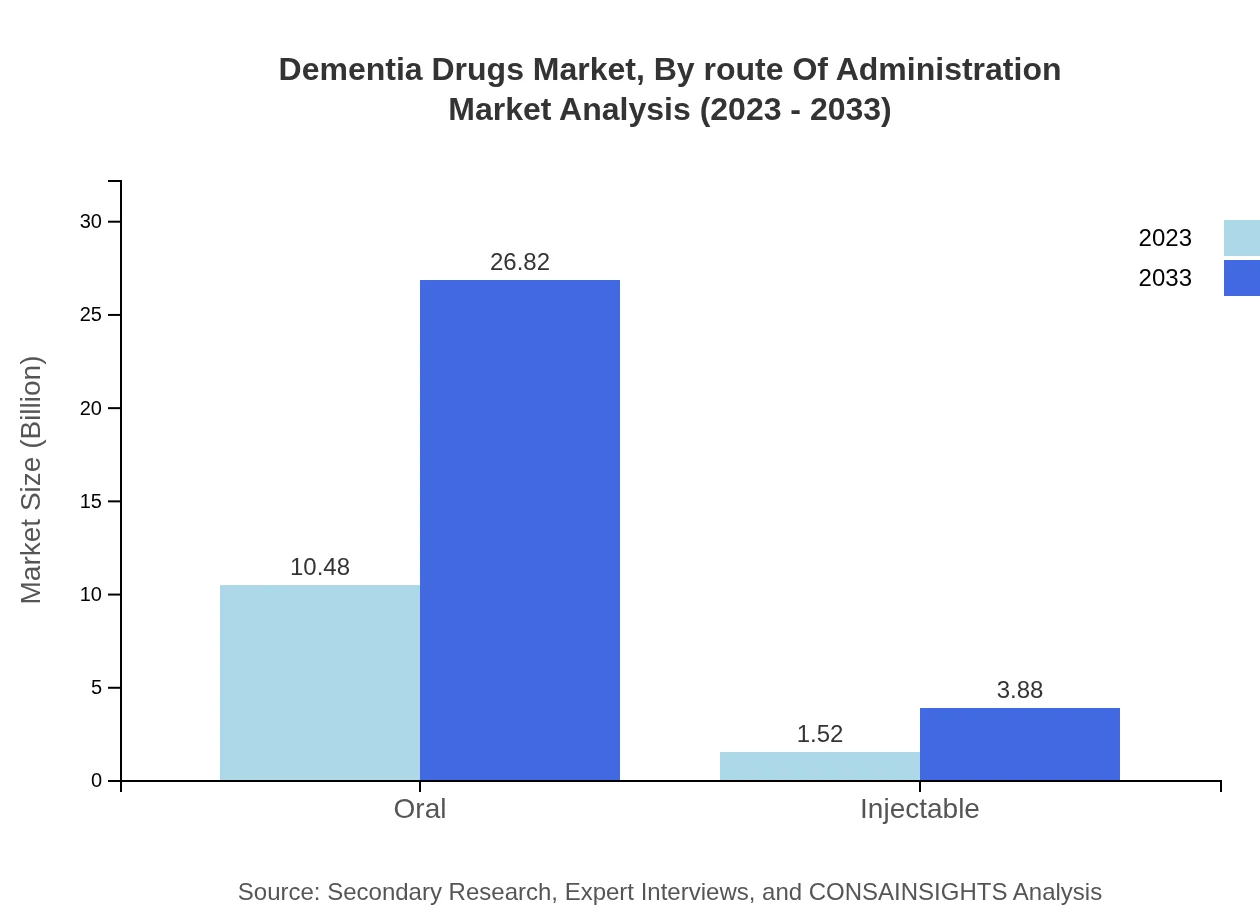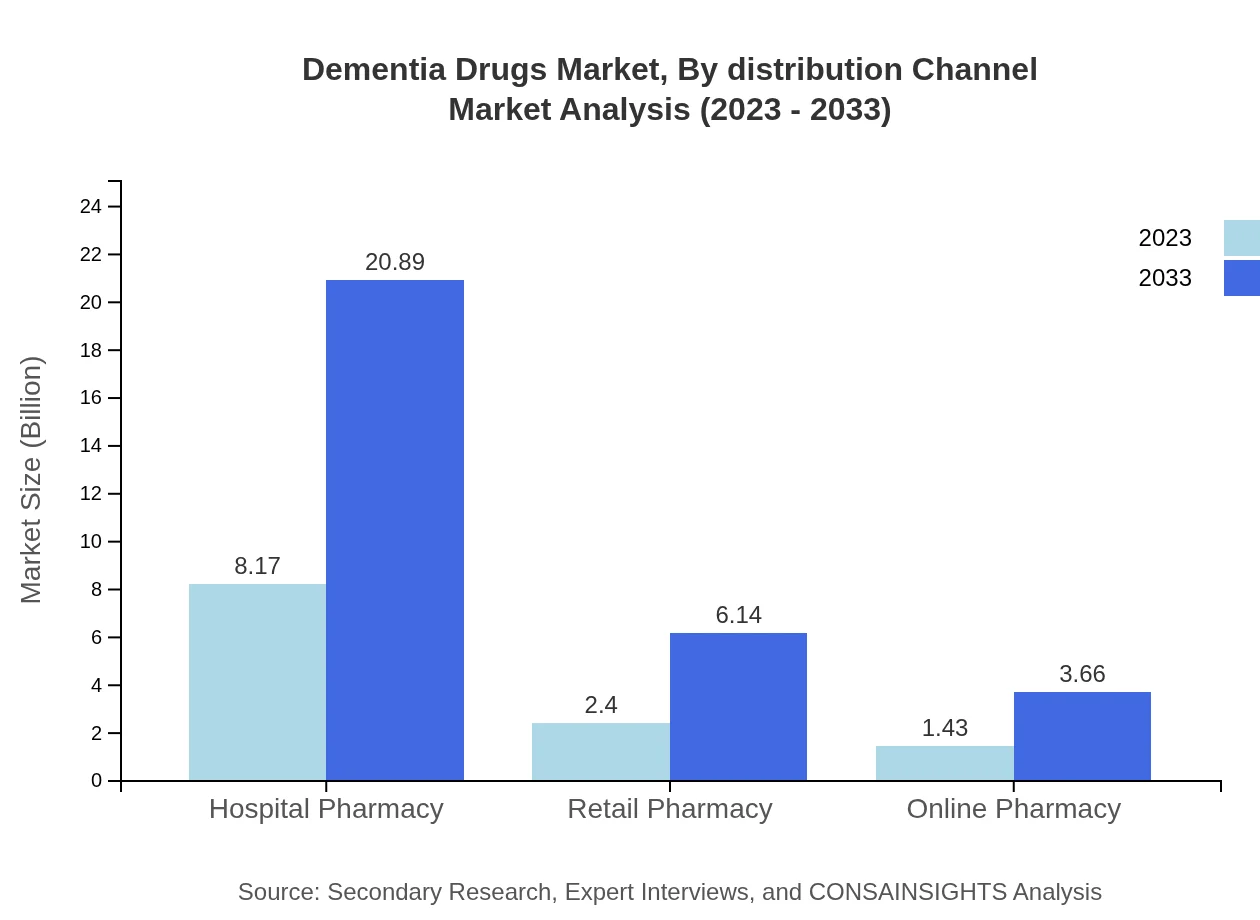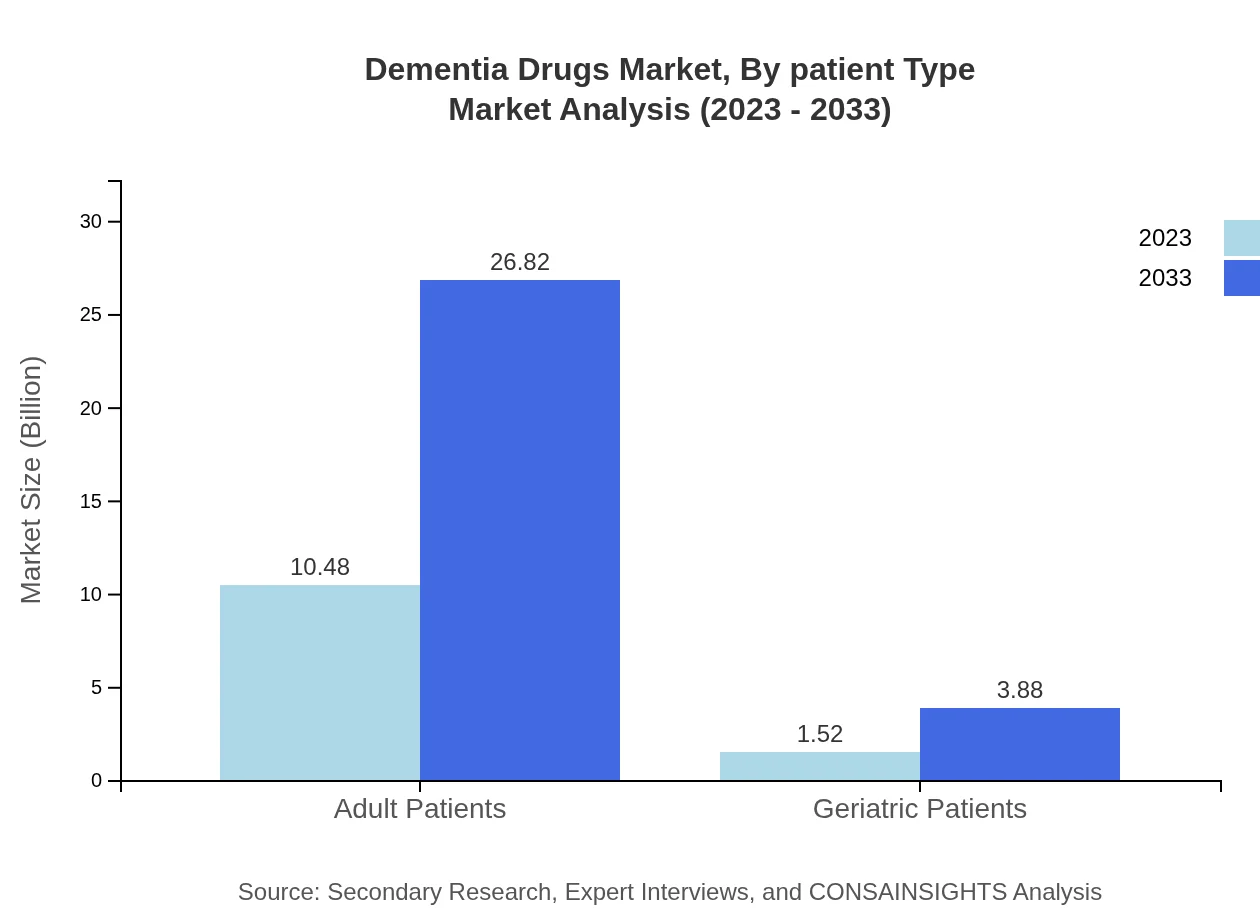Dementia Drugs Market Report
Published Date: 31 January 2026 | Report Code: dementia-drugs
Dementia Drugs Market Size, Share, Industry Trends and Forecast to 2033
This report provides a comprehensive analysis of the Dementia Drugs market, covering key insights, market trends, and data forecasts from 2023 to 2033. It includes assessments of market size, segmentation, regional analysis, and technology advancements that are shaping the future of dementia treatment.
| Metric | Value |
|---|---|
| Study Period | 2023 - 2033 |
| 2023 Market Size | $12.00 Billion |
| CAGR (2023-2033) | 9.5% |
| 2033 Market Size | $30.69 Billion |
| Top Companies | Eli Lilly and Company, Pfizer Inc., Biogen Inc., Roche Holding AG, Novartis AG |
| Last Modified Date | 31 January 2026 |
Dementia Drugs Market Overview
Customize Dementia Drugs Market Report market research report
- ✔ Get in-depth analysis of Dementia Drugs market size, growth, and forecasts.
- ✔ Understand Dementia Drugs's regional dynamics and industry-specific trends.
- ✔ Identify potential applications, end-user demand, and growth segments in Dementia Drugs
What is the Market Size & CAGR of Dementia Drugs market in 2023?
Dementia Drugs Industry Analysis
Dementia Drugs Market Segmentation and Scope
Tell us your focus area and get a customized research report.
Dementia Drugs Market Analysis Report by Region
Europe Dementia Drugs Market Report:
In Europe, the Dementia Drugs market size was approximately $3.15 billion in 2023, expected to grow to $8.07 billion by 2033. Factors include an aging population, improved healthcare infrastructures, and increasing research efforts in dementia treatment.Asia Pacific Dementia Drugs Market Report:
In the Asia Pacific region, the market size for Dementia Drugs was estimated at $2.49 billion in 2023 and is projected to reach $6.36 billion by 2033. The growth is propelled by increasing aging populations and rising healthcare expenditure, along with a growing focus on mental health.North America Dementia Drugs Market Report:
North America holds a substantial market share, with a market size of $4.42 billion in 2023 projected to rise to $11.30 billion by 2033. The prevalence of Alzheimer's and an advanced healthcare system enables rapid adoption of latest treatments and technologies.South America Dementia Drugs Market Report:
The South American Dementia Drugs market was valued at approximately $0.65 billion in 2023, with forecasts suggesting an increase to $1.67 billion by 2033. Limited access to healthcare and rising awareness about dementia therapies are significant contributing factors.Middle East & Africa Dementia Drugs Market Report:
For the Middle East and Africa, the market was valued at $1.29 billion in 2023 and is expected to reach $3.29 billion by 2033. The growth is driven by increasing healthcare awareness and advancing pharmaceutical sectors in key countries.Tell us your focus area and get a customized research report.
Dementia Drugs Market Analysis By Product
The product segmentation includes Cholinesterase Inhibitors with a market size of $8.17 billion in 2023, projected to grow to $20.89 billion by 2033. NMDA Antagonists and Combination Therapies also show promising growth, reinforcing the importance of varied treatment options to cater to a wide range of dementia symptoms.
Dementia Drugs Market Analysis By Indication
By indication, the market for Alzheimer's Disease, which is valued at $6.65 billion in 2023 and expected to reach $17 billion by 2033, dominates the sector. Vascular and Frontotemporal Dementia are also noteworthy segments, reflecting diverse therapeutic needs within the dementia category.
Dementia Drugs Market Analysis By Route Of Administration
The market segmentation by route of administration includes oral forms as the leading choice, accounting for 87.37% market share, valued at $10.48 billion in 2023, with prospects for growth up to $26.82 billion by 2033. Injectable forms, while smaller, are also crucial for specific patient populations.
Dementia Drugs Market Analysis By Distribution Channel
Hospital pharmacies capture a significant market share of 68.07%, valued at $8.17 billion in 2023, asserting their role as primary distribution channels. However, online pharmacies are rapidly gaining traction, reshaping traditional sales models, especially among tech-savvy patients.
Dementia Drugs Market Analysis By Patient Type
The market is largely driven by adult patients, representing an 87.37% share, indicating a focused approach toward middle-aged and elderly demographics. Geriatric patients, though a smaller segment, reflect the growing need for specialized treatments tailored to older populations.
Dementia Drugs Market Trends and Future Forecast
Tell us your focus area and get a customized research report.
Global Market Leaders and Top Companies in Dementia Drugs Industry
Eli Lilly and Company:
A leading biopharmaceutical firm focusing on innovative treatments for Alzheimer’s and other dementias. Their continued research is aimed at developing new therapies that enhance cognitive function.Pfizer Inc.:
A global pharma giant working on a diverse range of medications for neurological disorders, with a commitment to advancing dementia care through research and development.Biogen Inc.:
Known for its significant contributions to Alzheimer's drug development, Biogen is at the forefront of innovation with its proprietary therapies aimed at slowing disease progression.Roche Holding AG:
A leader in personalized healthcare with initiatives focused on research for neurological disorders, including robust pipelines for dementia drugs.Novartis AG:
Involved in developing dementia medications, Novartis is leveraging biotechnologies to produce effective treatments for diverse dementia types.We're grateful to work with incredible clients.









FAQs
What is the market size of dementia drugs?
The global dementia drugs market is currently valued at approximately $12 billion in 2023, with a projected compound annual growth rate (CAGR) of 9.5%, suggesting significant market expansion through 2033.
What are the key market players or companies in the dementia drugs industry?
Major players in the dementia drugs market include Eli Lilly, Pfizer, Novartis, and Johnson & Johnson, who dominate with their extensive product portfolios and innovative research activities aimed at developing effective treatments.
What are the primary factors driving the growth in the dementia drugs industry?
The growth in the dementia drugs industry is driven by factors such as increasing prevalence of dementia-related disorders, enhanced R&D activities, and rising awareness and acceptance of neurodegenerative disease treatments among healthcare providers and patients.
Which region is the fastest Growing in the dementia drugs market?
North America is projected to be the fastest-growing region in the dementia drugs market, expanding from $4.42 billion in 2023 to $11.30 billion by 2033, driven by advances in drug development and increased healthcare spending.
Does ConsaInsights provide customized market report data for the dementia drugs industry?
Yes, ConsaInsights offers customized market report data for the dementia drugs industry, tailoring insights to specific client needs, regional focuses, or particular market segments to ensure relevance and application.
What deliverables can I expect from this dementia drugs market research project?
Deliverables for the dementia drugs market research project include comprehensive market analysis reports, segment-wise breakdown, competitive landscape assessments, and future growth forecasts, all curated to inform strategic decisions.
What are the market trends of dementia drugs?
Current market trends in dementia drugs indicate a shift towards combination therapies, increased focus on molecular targets, personalization of treatment, and digital health advancements for monitoring patient conditions.

